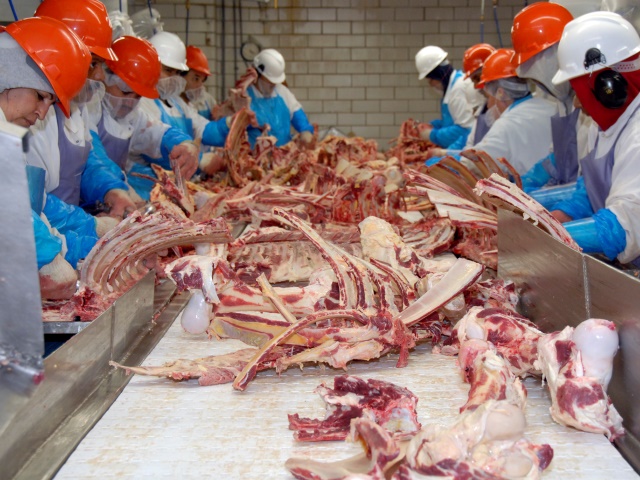COVID-Linked Food Security Concerns
"We don't anticipate having to deal with any sort of significant shortages at the meat counter in grocery stores across North America.""We have a well-integrated system in which product moves both ways across the border. So if individual plants close, we will often see both inventories that we have help buffer some of those closures, and the reallocation of supply from some of the other plants.""We might start seeing some more significant disruptions in the system where supplies may be compromised. Although we do expect a lot and have reasonably good inventories on hand, we might see prices go up.""But we would see much more significant issues at the producer [farm gate] level."Mike von Massow, food economist, University of Guelph
 |
BT_USDA_Beef_Meat_Packer_6
|
Physical distancing between workers at meat processing plants is a difficult attainment; the plants were designed and work to their maximum when employees work in close communion. And that is a problem when social isolation is required to ensure that the highly contagious novel coronavirus is brought under control. Also, the fact that most workers at meat-processing facilities have been brought into the country as temporary workers, signed up for two-year stints, from Mexico, Asia and Africa. They are less likely to take recommendations from the health community and government agencies seriously about the need to distance themselves from others.
"Meat-packing’s low wages, combined with a dangerous and unpleasant work environment, make the job unattractive to most Canadians. In old-style plants, work varied between hog and cattle slaughter, and workers split their time between the kill floor and processing. But modern plants slaughter a single species. Most line workers stand shoulder to shoulder and make the same cuts over and over. Repetitive motion injuries are commonplace. Meat processing workers have the highest rate of disabling injury and disease among all manufacturing employees in the province. Injuries and low pay contribute to high employee turnover—6 to 8 per cent a month among line workers. This means about 1,800 workers leave Lakeside (Alberta) each year and must be replaced.""About 3,500 mostly sub-Saharan refugees have moved to Brooks since 2000. They now account for about a quarter of the town’s population, the largest single source country being Sudan, followed by Ethiopia and Somalia. The African community is thriving; African grocery stores, hairdressers, a music shop and a nightclub enrich the community with their presence."Michael Broadway, Alberta Views
 |
| Cargill meats has shut down due to COVID-19 near High River on Tuesday, April 21, 2020. Darren Makowichuk/Postmedia |
Now, across North America, the meat-packing industry has become one of those vulnerable-to-infection hot-spots, while remaining one of the industries held to be indispensable to societal functioning. Over a dozen meat processing plants across the continent have been temporarily shut down as a result of workers being infected with COVID-19. Consumers aware of this have begun to take notice, just as they were concerned over other food availability leading to hoarding and shortage of eggs, flour and unaccountably, toilet paper.
If, suddenly or gradually, consumers were met with the sight of empty refrigerated shelves as has already occurred temporarily, until the public plucked commonsense off the high, dark cupboard shelf they had tucked it into in a panic over disappearing food -- by the sight of brightly lit shelves absent ground beef, steaks roasts, pork and chicken, a nightmare scenario would impact the public and keep governments awake at night, leaving livestock farmers in a dilemma of how to manage their overstock of animals, with plant closures.
 |
| COVID-19 has affected meat packing plants across North America. |
The High River meat-packing plant, Cargill, whose output represents "roughly 40 percent of the beef processing capacity in Canada", temporarily closed operations when an employee died and over 360 workers tested positive for COVID-19. And following a two-week shutdown due to an outbreak in its meat processing facility in Yamachiche, Quebec, Olymel reopened. Smithfield Foods in Sioux Falls, South Dakota shuttered its pork factory after a coronavirus outbreak infected over 800 of its workers.
Meat company JBS USA shuttered its Minnesota pork processing facility following two dozen employees testing positive for COVID. "Nobody can quite figure out how meat processing workers can safely work alongside one another without running the risk of transmitting the virus", Rachel Maddow of MSNBC reported. So the very real fears of consumers do have a groundwork of reality they are based upon.
But, as von Massow points out, that concern is centered on the scale and duration of plant closures. Should facilities close more frequently and remain closed for longer periods, there could very well be a change in the situation where shortages become acute and consumers have real-time reason to panic. Disruptions of any kind have their repercussions. New ways to hold or divert animals to alternate processors in the hope of avoiding bottlenecks consume the attention of meat processors and livestock farmers.
For as senior director of the agri-food analytics lab at Dalhousie University, Sylvain Charlebois noted in a newsletter, farmers face increased costs related to the pandemic, having to house animals for longer periods, and having to ship them further distances. High inventory also means they must sell livestock at reduced prices. "We should be cognizant of [those pressures] and probably look at ways that we could support farmers through those difficult times."
 |
| Cargill set up tents to provide screening for its workers, similar to what Alberta Health Services has done for health-care workers. (Dan McGarvey/CBC) |
Labels: Closures, Meat Processing Plants, North America, Noval Coronavirus

0 Comments:
Post a Comment
<< Home